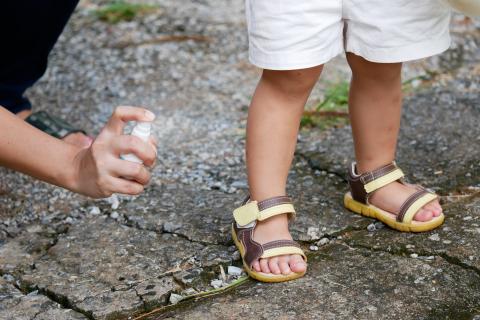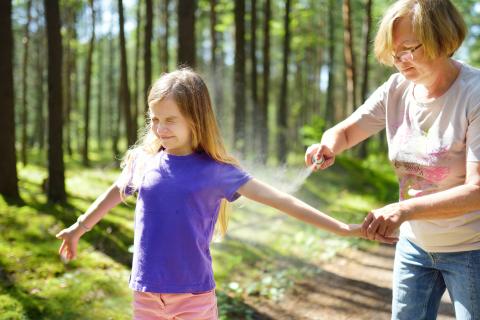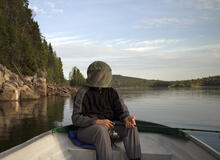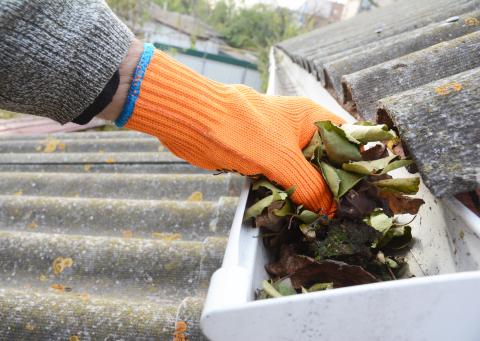Mosquito Bite Prevention
Fight the Bite: Prevent Mosquito Bites
When enjoying time outdoors during warmer months, it is important to be aware of mosquitoes and take steps to protect yourself from bites.
You can take several steps to "fight the bite" and prevent illnesses spread by mosquitoes.
Prevention steps include using personal protection and getting rid of mosquito breeding habitats in your yard.
Mosquitoes are usually most active in Wisconsin from May to September, but can stay active until temperatures become too cold for them to survive.
Personal protection
There are many steps you can take to protect yourself from mosquito bites.
- Use insect repellents with 20–30% DEET, 10–20% picaridin, 10–20% IR3535, or 30–40% oil of lemon eucalyptus on skin and clothes to prevent mosquito bites.
- Parents should apply repellents to their children, and be sure to avoid hands, eyes, and mouth.
- Do not use repellents on children under two months of age, and do not use products containing oil of lemon eucalyptus on children under three years of age.
- Apply permethrin (a pesticide that kills mosquitoes) to clothes and gear to prevent mosquito bites. Permethrin kills mosquitoes when they land on your clothes. It lasts through several washes after it is applied. Do not apply directly to skin.
- Carefully apply repellents according to the label instructions.
- Wash skin that has repellent on it after coming indoors.
- Some repellents need to be applied more often than others. Find which repellent is right for you at the Environmental Protection Agency website.
- For more information on insect repellents, visit the Department of Health Services (DHS) Tick and Insect Repellents webpage and read Insect Repellent Essentials: A Brief Guide (PDF) from the Northeast Regional Center for Excellence in Vector-borne Diseases.
- Wear long-sleeved shirts, long pants, socks, and shoes outdoors during peak mosquito activity hours. Apply repellent to any bare skin not covered by clothing.
- Wear loose-fitting and thicker clothing so it is more difficult for mosquitoes to bite through clothes to your skin.
- Wear head nets if you go into areas with high mosquito activity.
- Place screens on windows and doors, and check them often to make sure they are sealed tightly and in good condition.
- Stay indoors during peak mosquito activity hours, usually dusk and dawn for most mosquitoes found in Wisconsin.
Mosquito control
There are easy ways to lower the number of mosquitoes you come into contact with.
Mosquitoes need water to breed. In order to get rid of mosquito breeding habitats, drain anything in your yard that collects water or allows water to stand. Mosquitoes only need a small amount of water to breed, so it is important to remove all standing water from air conditioning units, tires, tarps, wheelbarrows, or other household items.
Follow the tips listed below for removing and preventing standing water in your yard:
- Trash and recycling bins: Cover outdoor trash and recycling cans with tight-fitting lids.
- Flower pots: Drain dishes under flowerpots every few days and after rainstorms.
- Leaves: Clean up leaves and yard debris from low-lying areas to reduce stagnant water pools.
- Gutters: Gutters and downspouts need to be kept clean and maintained as leaves can create pools of water.
- Tire swing: Make a hole in the bottom of the swing to allow water to drain.
- Birdbaths and pet dishes: Replace water in birdbaths, fountains, and your pets' water dishes at least twice a week.
- Water gardens and fountains: Check with the Department of Natural Resources (DNR) about using larvicides.
Apply mosquito-killing pesticides in the springtime to reduce the number of mosquitoes in your yard.
- Speak to or hire a professional pesticide company before using pesticides.
- Visit the Department of Natural Resources pest control pollutant discharge page for information on using larvicides (pesticides that kill mosquito larvae) in ponds, lakes, rivers, and streams.
- The Wisconsin Department of Agriculture, Trade, and Consumer Protection regulates the use of pesticides in Wisconsin. It is important to identify these regulations before pesticide application.
- Visit the Environmental Protection Agency's Pesticide Safety site for more information about safe and correct use of pesticides.
Resources
- Jamestown Canyon Virus Fact Sheet, P-02452 (PDF): Educational fact sheet for the general public on Jamestown Canyon Virus, covering signs and symptoms, treatment, and prevention.
- Malaria Disease Fact Sheet, P-42071 (Multiple Languages): Educational fact sheet for the general public on malaria, covering signs and symptoms, transmission, and prevention.
- Planning to Get Away for Spring Break? Protect Against Zika, P-01695B (English and Spanish): An educational flyer on protecting yourself against Zika virus while traveling.
- Protecting Your Family From Mosquitoes and Ticks, P-02080 (PDF): A fact sheet with simple steps you can take to protect yourself from mosquitoes.
- West Nile Virus Fact Sheet, P-42104 (Multiple Languages): Educational fact sheet for the general public on West Nile virus, covering signs and symptoms, treatment, and prevention.
How to order resources
Resources can be ordered for free from DHS. Here's how:
- Download the Microsoft Word document F-80025A (Word) (this can be used to order multiple forms and publications).
- Complete the form by tabbing through the input fields, not by using the return or enter key.
- Email the completed form to the DHS forms manager at dhsfmorder@dhs.wisconsin.gov.
- If you have questions about ordering forms or publications, email the DHS forms manager at dhsfmorder@dhs.wisconsin.gov or call 608-266-8502.
Mosquito Bites Are Bad (PDF): An educational activity book for kids about preventing illnesses spread by mosquitoes.
- Midwest Center of Excellence for Vector-Borne Disease: Information on research projects that improve the management of ticks and mosquitoes and prevent vector-borne diseases
- Wisconsin Mosquitoes and Mosquito-Borne Diseases, Preventing Mosquito Bites: Information on ways to prevent mosquito bites, from our partners at the University of Wisconsin-Madison Medical Entomology Laboratory.
- Wisconsin Mosquitoes and Mosquito-Borne Diseases: Information on mosquitoes and diseases they spread from our partners at the University of Wisconsin-Madison Medical Entomology Laboratory.
Questions about illnesses spread by mosquitoes?
Contact us by phone 608-267-9003 or fax 608-261-4976.




